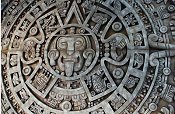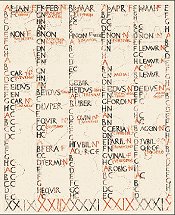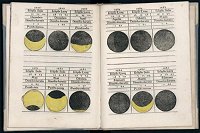an abbreviated history
|
A calendar can define many things, from a daily planner and meeting agenda, to a list of court cases and/or meeting times for legislative committees. For most people in the world, it relates to the list of days presented through twelve months of a year, from January to December.
The first Roman calendar was developed in the 7th Century BC, believed to have been created by Romulus, the founder and first king of Rome. The seasons were based on the agricultural year, and the Ancient Roman calendar contained only The Roman calendar was developed approximately 450BC to coincide with the schedules of the civil magistrates, who moved the first of the year to January when their consuls were installed to office. By the time of Julius Caesar, much confusion ruled the telling of time, and celebrations, such as the one at harvest time, was approximately three months off. Following the visits of Julius Caesar to Egypt, and learning from Cleopatra the success of the Egyptian calendar based on the solar year, he modified the calendar used in Rome. With the aid of an Alexandrian astronomer dividing the days between equinoxes of the Sun to include a total of 365.25 days per year, he directed the changes necessary to issue the Julian calendar on 1 January 46BC, which remained in use for over 2 thousand years. It was not until the 6th Century AD that a monk known as Denis the Short proposed dating events, previously recorded to reflect imperial reign rather than an exact date, be documented as before or after the Birth of Christ. Almost 100 years later, another monk by the name of Bede began the laborious task of writing the history of civilization, and the concept of using BC (Birth of Christ) and AD (Anno Domini - latin for 'in the year of our Lord') came to common practice. The concept of zero was not considered by either Denis the Short or Bede, which continues to be argued centuries later as to when a new century ends and begins.
By the papacy of Pope Gregory XIII in 1572, it was becoming apparent the Julian calendar was losing days, which could eventually miscalculate many religious observances. Among his many other reforms, the restructuring of the Julian calendar became his most enduring accomplishment. Although the Gregorian calendar is the most commonly accepted calendar in today's world, it coexists with many religious and cultural calendars. The Julian calendar continues as a lithurgical calendar in the Eastern Orthodox Church. Israel uses the Hebrew calendar, which has been acknowledged for over 5 thousand years, as has the Iranian calendar in Iran and Afghanistan, and the Islamic calendar, used by most non-Iranian Muslims worldwide. The Chinese, Hindu, Buddhist, Ethiopian, the Thai solar calendar, and over 40 other calendars are still in use. |
 It is believed ancient people in many parts of the world developed their own systems of measuring time based on solar and lunar cycles, using monolith structures as well as etchings and carvings on stone. Approximately 6 thousand years ago, the ancient Egyptians developed an accurate calendar by using a notched stick in the Nile to measure its ebbs and flows. Although in Ancient Greece there existed many different methods of measuring time, most were based on the cycles of the moon as it related to the movement of the sun.
It is believed ancient people in many parts of the world developed their own systems of measuring time based on solar and lunar cycles, using monolith structures as well as etchings and carvings on stone. Approximately 6 thousand years ago, the ancient Egyptians developed an accurate calendar by using a notched stick in the Nile to measure its ebbs and flows. Although in Ancient Greece there existed many different methods of measuring time, most were based on the cycles of the moon as it related to the movement of the sun.
 ten months, the winter season being considered a dark time, with the rebirth of the year in the spring. According to legend, it was the 2nd king of Rome, Numa Pompilius, who added the extra two months, since obviously the old calendar would eventually outdate itself insofar as tracking the agricultural cycle. The number of days inside these months, however, varied and sometimes overlapped.
ten months, the winter season being considered a dark time, with the rebirth of the year in the spring. According to legend, it was the 2nd king of Rome, Numa Pompilius, who added the extra two months, since obviously the old calendar would eventually outdate itself insofar as tracking the agricultural cycle. The number of days inside these months, however, varied and sometimes overlapped.
 Because the Julian calendar had lost 10 days over the years, Pope Gregory XIII issued a decree the measure of time would officially change on 4 October 1582, to be followed by 15 October, and that the calendar year would begin on 1 January. An action which brought a great deal of opposition, not all countries chose to accept the papal edict and remained with the Julian calendar. Dominately Catholic countries slowly changed, but the Protestant countries, such as Britain and the American colonies, did not change to the Gregorian calendar until 1753. Russia crossed over from the Julian calendar following the death of the Czar in 1917, and the last was Greece in 1923.
Because the Julian calendar had lost 10 days over the years, Pope Gregory XIII issued a decree the measure of time would officially change on 4 October 1582, to be followed by 15 October, and that the calendar year would begin on 1 January. An action which brought a great deal of opposition, not all countries chose to accept the papal edict and remained with the Julian calendar. Dominately Catholic countries slowly changed, but the Protestant countries, such as Britain and the American colonies, did not change to the Gregorian calendar until 1753. Russia crossed over from the Julian calendar following the death of the Czar in 1917, and the last was Greece in 1923.